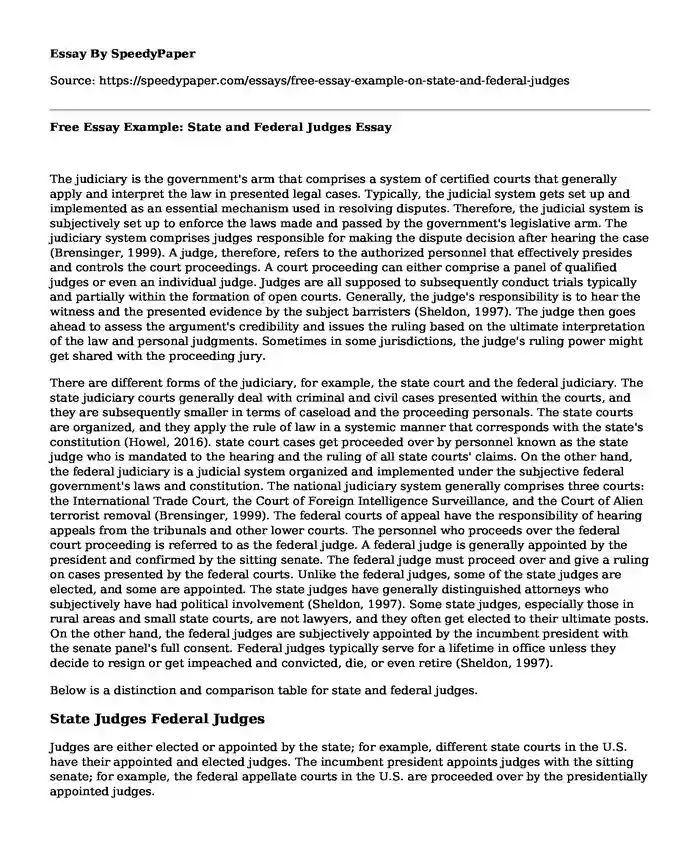
| Type of paper: | Essay |
| Categories: | Law Government |
| Pages: | 3 |
| Wordcount: | 717 words |
The judiciary is the government's arm that comprises a system of certified courts that generally apply and interpret the law in presented legal cases. Typically, the judicial system gets set up and implemented as an essential mechanism used in resolving disputes. Therefore, the judicial system is subjectively set up to enforce the laws made and passed by the government's legislative arm. The judiciary system comprises judges responsible for making the dispute decision after hearing the case (Brensinger, 1999). A judge, therefore, refers to the authorized personnel that effectively presides and controls the court proceedings. A court proceeding can either comprise a panel of qualified judges or even an individual judge. Judges are all supposed to subsequently conduct trials typically and partially within the formation of open courts. Generally, the judge's responsibility is to hear the witness and the presented evidence by the subject barristers (Sheldon, 1997). The judge then goes ahead to assess the argument's credibility and issues the ruling based on the ultimate interpretation of the law and personal judgments. Sometimes in some jurisdictions, the judge's ruling power might get shared with the proceeding jury.
There are different forms of the judiciary, for example, the state court and the federal judiciary. The state judiciary courts generally deal with criminal and civil cases presented within the courts, and they are subsequently smaller in terms of caseload and the proceeding personals. The state courts are organized, and they apply the rule of law in a systemic manner that corresponds with the state's constitution (Howel, 2016). state court cases get proceeded over by personnel known as the state judge who is mandated to the hearing and the ruling of all state courts' claims. On the other hand, the federal judiciary is a judicial system organized and implemented under the subjective federal government's laws and constitution. The national judiciary system generally comprises three courts: the International Trade Court, the Court of Foreign Intelligence Surveillance, and the Court of Alien terrorist removal (Brensinger, 1999). The federal courts of appeal have the responsibility of hearing appeals from the tribunals and other lower courts. The personnel who proceeds over the federal court proceeding is referred to as the federal judge. A federal judge is generally appointed by the president and confirmed by the sitting senate. The federal judge must proceed over and give a ruling on cases presented by the federal courts. Unlike the federal judges, some of the state judges are elected, and some are appointed. The state judges have generally distinguished attorneys who subjectively have had political involvement (Sheldon, 1997). Some state judges, especially those in rural areas and small state courts, are not lawyers, and they often get elected to their ultimate posts. On the other hand, the federal judges are subjectively appointed by the incumbent president with the senate panel's full consent. Federal judges typically serve for a lifetime in office unless they decide to resign or get impeached and convicted, die, or even retire (Sheldon, 1997).
Below is a distinction and comparison table for state and federal judges.
State Judges Federal Judges
Judges are either elected or appointed by the state; for example, different state courts in the U.S. have their appointed and elected judges. The incumbent president appoints judges with the sitting senate; for example, the federal appellate courts in the U.S. are proceeded over by the presidentially appointed judges.
Judges mainly proceed over civil and criminal cases. Judges mainly proceed over appealed cases.
In comparison, both state and federal judges can get appointed by the authority in places, such as the state authority, which is the constitution, and the presidential authority which has the supreme power. Additionally, both the state and the federal judges generally proceed over disputes presented within the law courts. Conclusively, all judges have a mandate to proceed, hear, and issue rulings to cases presented in law courts.
Works Cited
Sheldon, C. H., & Maule, L. S. (1997). Choosing justice: The recruitment of state and federal judges. Pullman, Wash: WSU Press.
HOWELL, C. H. A. R. L. E. S. B. O. Y. N. T. O. N. (2016). MICHIGAN NISI PRIUS CASES, DECIDED BY THE STATE AND FEDERAL COURTS IN MICHIGAN: To which are ... added brief biographical sketches of the judges of. Place of publication not identified: FORGOTTEN Books.
Brensinger, T. L. (1999). Judges. Scottdale, Pa: Herald Press.
Cite this page
Free Essay Example: State and Federal Judges. (2023, Dec 06). Retrieved from https://speedypaper.com/essays/free-essay-example-on-state-and-federal-judges
Request Removal
If you are the original author of this essay and no longer wish to have it published on the SpeedyPaper website, please click below to request its removal:
- Essay Sample Focusing on Cryptocurrency Taxation in Australia
- Free Essay - Labor Movement and Rhetoric
- Free Essay Example on Water Stations
- Free Essay Sample Describing the Public Administration Case Study
- Local Crime Prevention Program - Free Essay
- Police Brutality: Time for Reforms and Body Cameras - Essay Sample
- Paper Sample on Mexican Drug Trafficking Organizations
Popular categories




